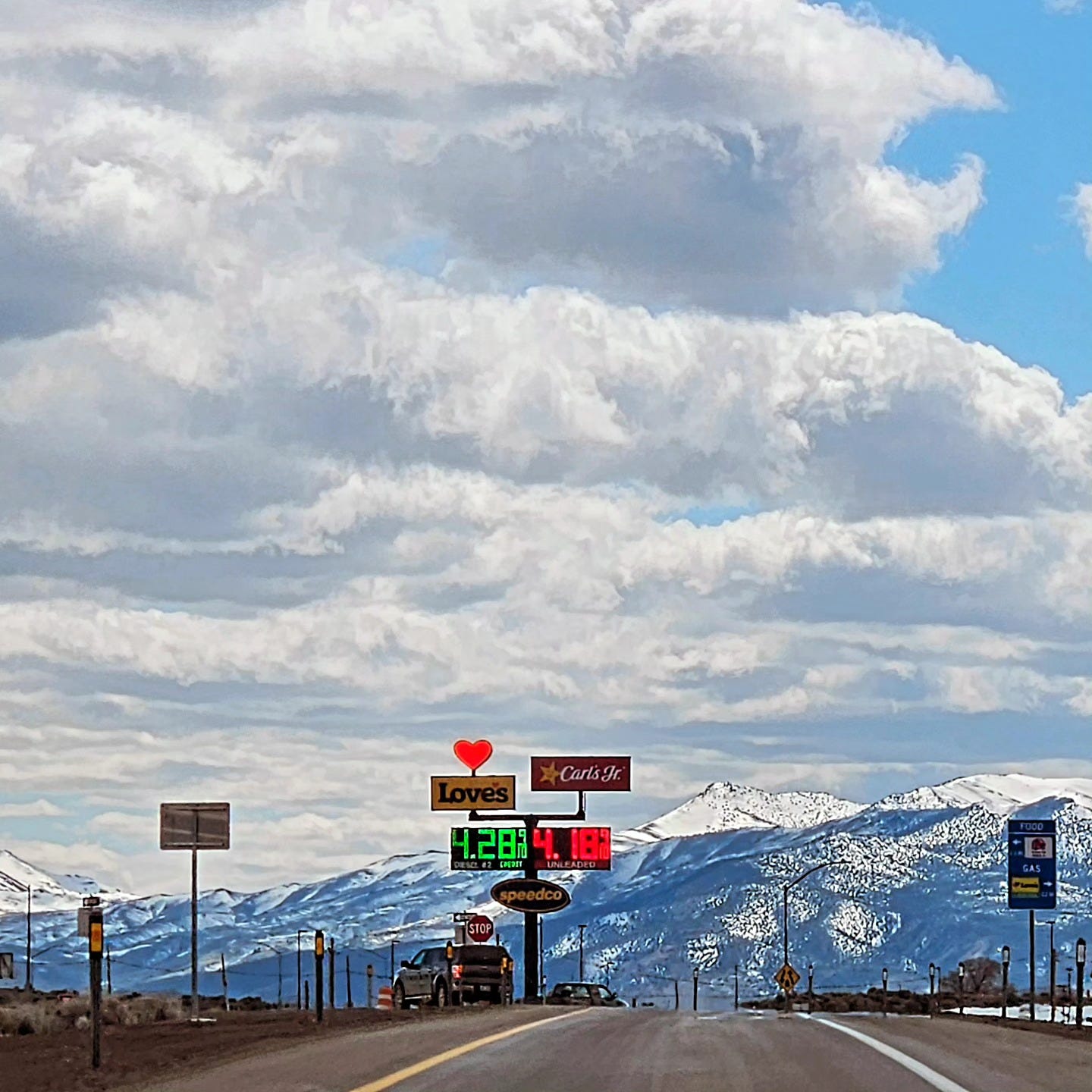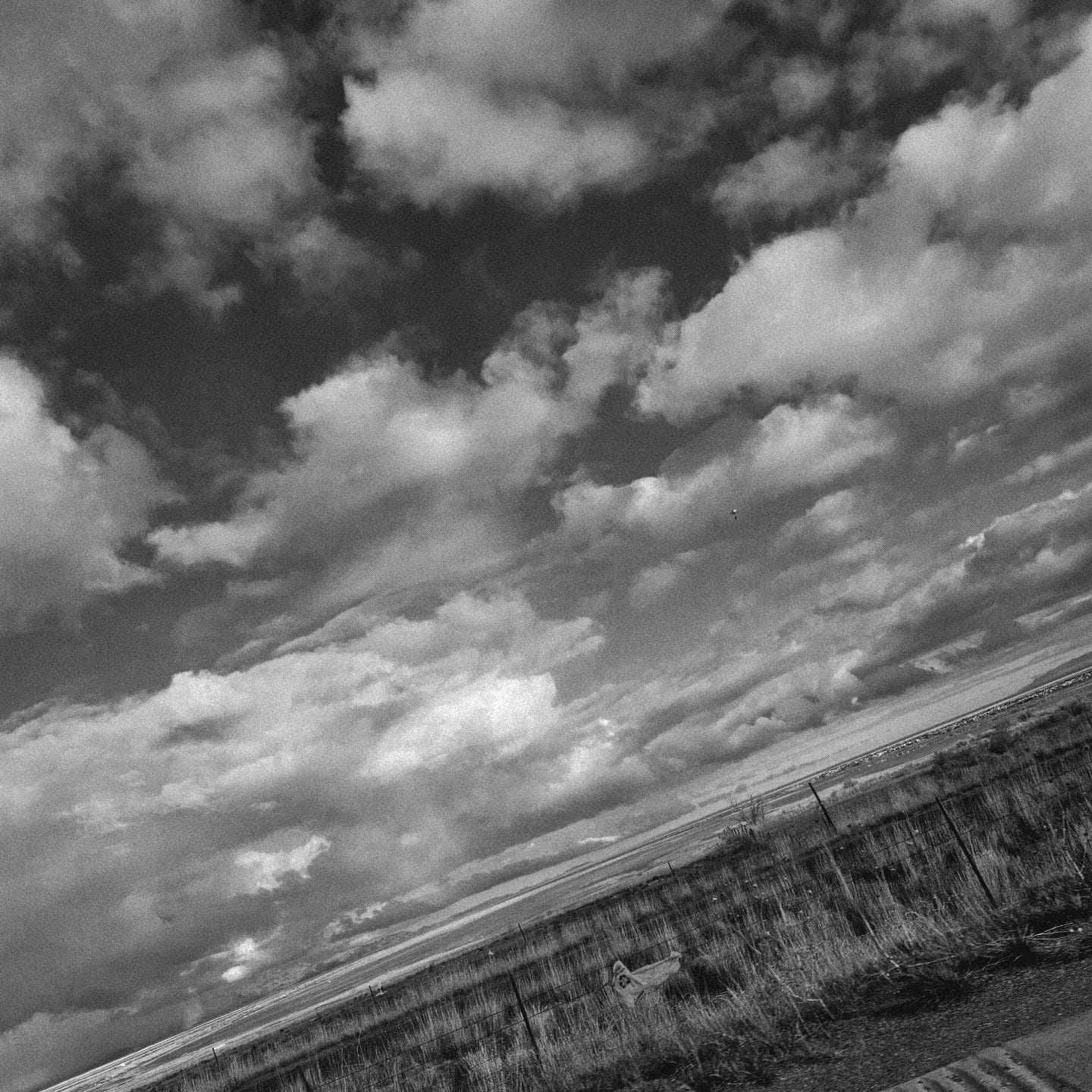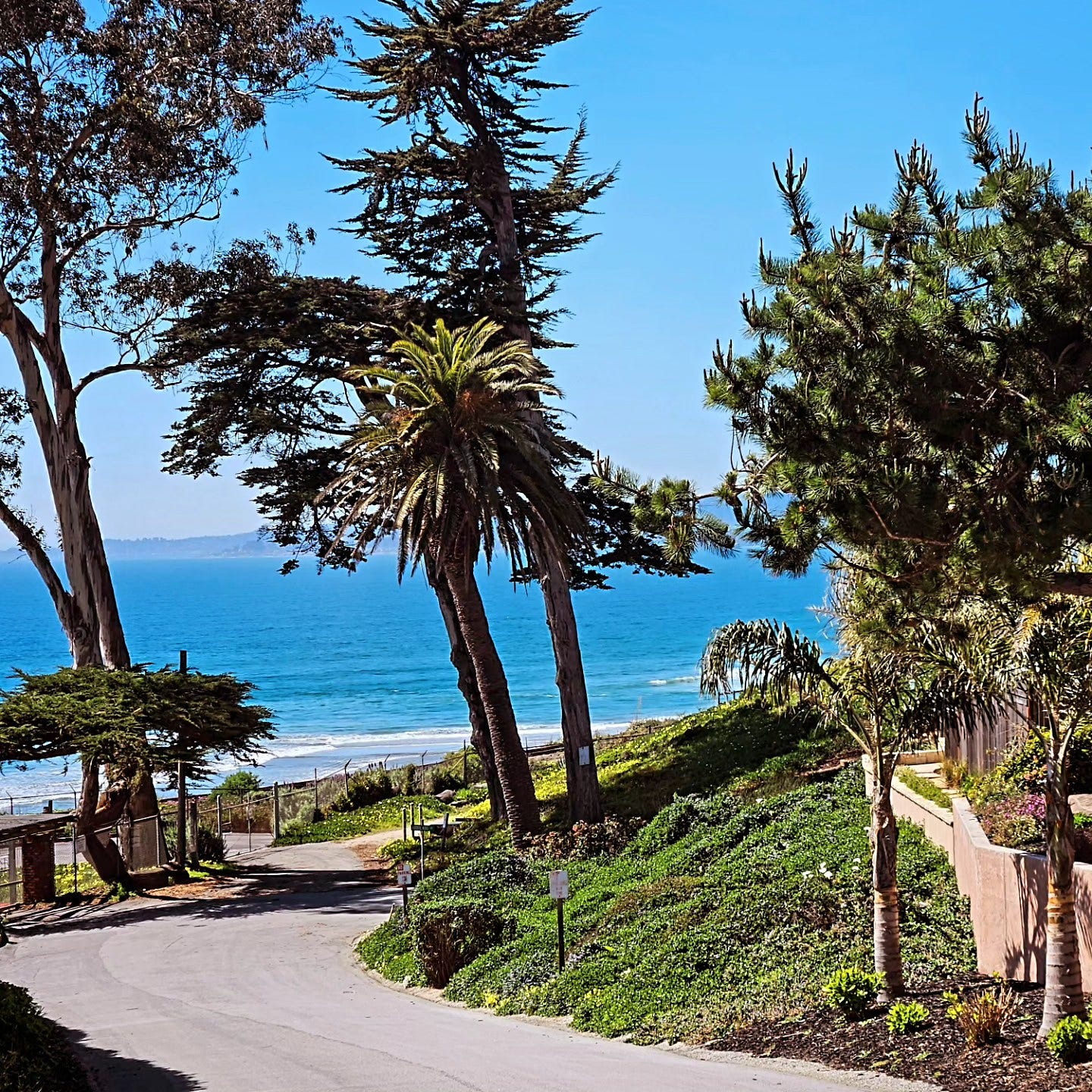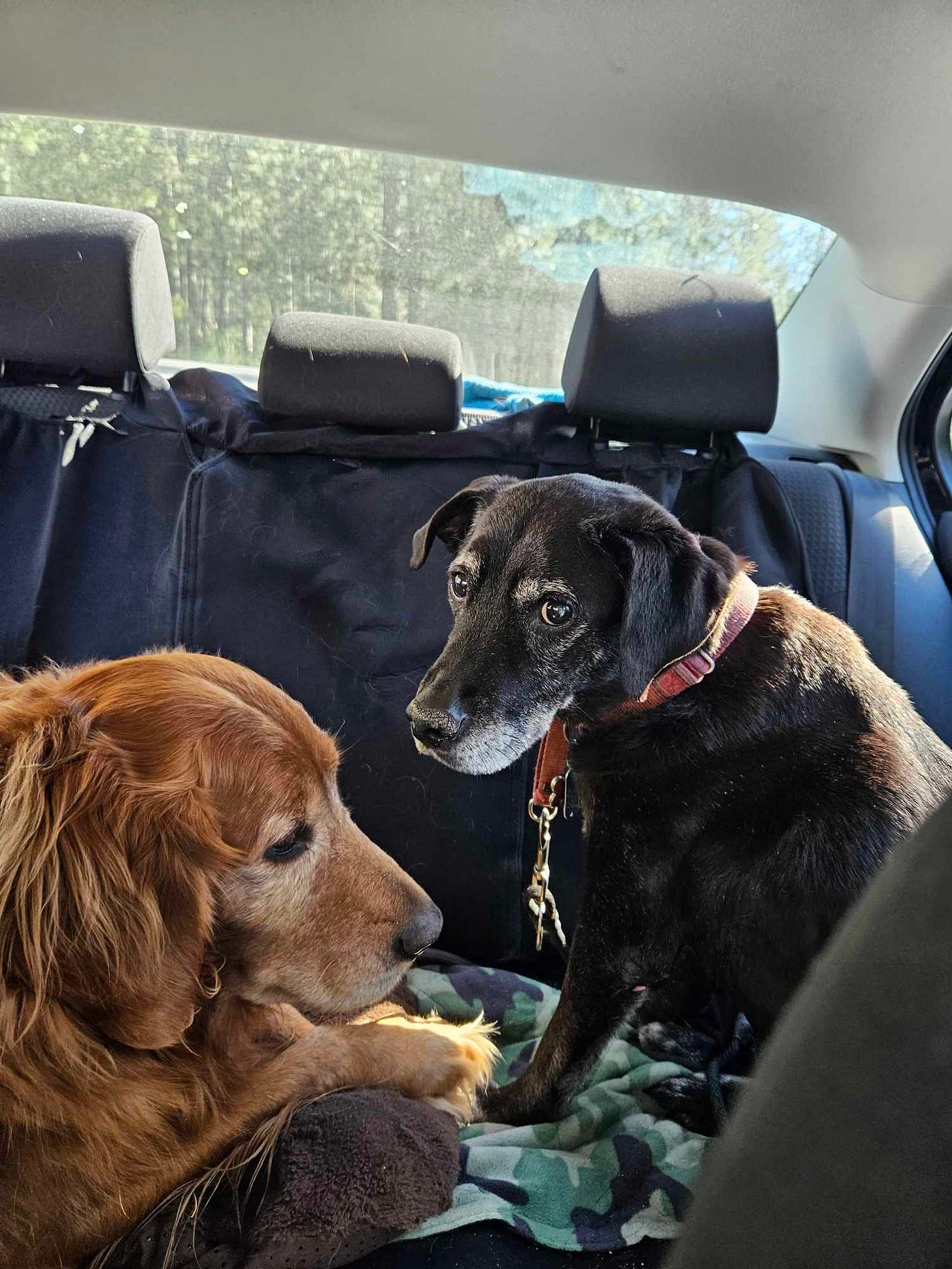Last week, after living for 25 years in North Carolina, my brother decided to pull up stakes and move back to California. So he put his two old and anxious dogs in the back seat of his ten-year-old VW Jetta and took off, just like a character in a country and western song, and my sister and I set out to accompany him for half the journey home.
My sister did the first half and I did the second, which was very much a mixed blessing. After all, the weather in April in the Rockies is chancy at best, especially in these climate-wracked times, and our plan started to seem increasingly precarious, especially when my plane into Denver bucked like a bronco on its descent: so much so that the flight attendants had to remind us that the vomit bags could be located in the seatback in front of you. Truly, the air above America at that particular location is not very stable, just like the air of America itself. The very next day, our westward journey ground to a halt in Laramie Wyoming, both directions of Highway 80 having been stopped cold due to hundred mile an hour winds.
Now I always says that my favorite kind of day is one where I am in a strange city with a notebook in hand. But it turns out that Laramie Wyoming defies that maxim. In Laramie, civilization centers itself at the Walmart Superstore on the corner of E. Grand and I-80. People come from miles around on Saturdays, to buy groceries, and clothing, and electronics, and everything else you can think of, and while on the one hand it looks like every big box store you’ve ever been to – i.e., like big box – in the context of Wyoming, it also resembles an ocean liner moored in the middle of the prairie. Going there feels like you’ve been plopped into the middle of the South Atlantic, only in the water, not on land.
I went there to buy a bathing suit, so I could float around in the hotel hot tub and stare at the stormy sky through the skylight. That was fun, or fun-nish, in the same way that staying in hotels, ordering Dominos, and eating vending machine food is fun when you’re a little kid. But it wasn’t like the best Saturday night I’ve ever had, and at least half of it was taken up with worrying about our forward progress. All night long the wind howled outside my hotel window, as I lay there stressing about the long winter of Laura Ingalls Wilder, A High Wind Over Jamaica, Cat Stevens’ song “The Wind,” and of course this poem by A.A. Milne:
Noone can tell me, nobody knows/where the wind comes from/where the wind goes.
The next day, the wind had died down just enough to let some vehicles through – meaning, giant trucks, the ones deemed too heavy to blow over, and us. The kindly desk clerk said, soothingly, “you’ll be alright – just make sure you keep a big distance between you and everyone else.” But of course, we couldn’t do that, as weaving trucks, careening down I- 80 whipping from one side to another, would bear down on us, or even box us in. It was frankly terrifying. And the landscape! You know how in Macbeth he talks about the Blasted Heath? It was like that, except there was probably a village or a cottage nearer to Dunsinane and Birnam Wood; at least there were witches.
In Wyoming? No such luck. A witch or two would actually have come in handy, I thought. Because although Wyoming is beautiful in its stark way, and it’s wonderfully easy to imagine it as it was when it was indigenous, we were skirting by the Wind River Reservation the whole time, so of course settler colonialism was very much on my mind. I teach the book “There There” by Tommy Orange, and papers are due this week, so it was easy for me to recall the prologue from memory: “When they first came for us with their bullets, we didn’t stop moving even though the bullets moved twice as fast as the sound of our screams, and even when their heat and speed broke our skin, shattered our bones, skulls, pierced our hearts, we kept on, even when we saw the bullets send our bodies flailing through the air like flags, like the many flags and buildings that went up in place of everything we knew this land to be before. The bullets were premonitions, ghosts from dreams of a hard fast future.”
===
As that quote indicates, driving across America is actually a kind of a heavy journey, even if you don’t have a death connected to it like it so happened that we did. Every state is so wildly different, not only in landscape, but in its beliefs, in strengths and weaknesses, and in its natural needs and desires. One thing that will nag at you the entire time you cross this space is the fact that an unpopulated states like Wyoming get two whole Senators to themselves.
In Wyoming, we stopped to walk the dogs in both Rawlins and Rock Springs, where, I am happy to report, you can now get Boba bubble tea, thanks to the internet and to Amazon, I suppose. And eventually the wind began to abate, only to be replaced by light snow as the plains and rocky promontories began to give way to steep inclines, orange cliff faces, and billboards announcing facts about the feasibility of fetal heart beats.
From Utah onward, the trip was more or less straightforward, i.e. super long, and super beautiful, and super, duper, cursed; haunted by a history that is very much in keeping with Faulkner’s famous adage, “The past isn’t over, it isn’t even past.” Utah has to be America’s most beautiful state, but there is always the sense there of an impending apocalypse, from the quasi-homeless man in the lobby of my hotel who was barefoot and bearded like a stink-ridden prophet, to the fact that the Great Salt Lake is quite visibly shrinking. Utah is in the firing line for the most drastic of all climate catastrophes, since the former president took away millions of acres of national park for resource extraction and says he’ll do it again by cancelling the Antiquities Act. Yet apparently Utahns still think he’s awesome, accustomed as they are to supporting grim nonsense made up by accused rapists.
The whole state is pretty goth, really. One passes through Skull Valley before reaching the Bonneville Salt Flats and a former Air Force base at Wendover where the V1 bombers dropped loads on the dry lake beds…in short, it’s surprisingly easy to imagine a horror movie taking place there. Or at least an episode of “Scooby Doo.”
After Utah comes Nevada, which like Wyoming before it is all about resource extraction, making it feel like part of the problem, not part of the solution. In Nevada, once every hundred miles or so, you pass a federal prison, because America’s been increasingly punitive since the 1970s, whence began the War on Drugs. Drugs won, of course, but so did Nevada: America now contains 25% of the world’s prison population, many of whom must are housed here.
Nearing Reno we got into an enormous traffic jam, which, along with the charging stations in the parking lots, made us feel like we were almost home. Well, that and the sharp smell of pine trees in snow wafting down from the Sierras. Climbing out of that basin up to the Donner Pass is a familiar journey for anyone who grew up here, and after that it is all downhill. The Nut Tree, the Milk Pail, the Carquinez Straights, i.e. the Yolo Causeway to Vallejo, somewhere between which, Joan Didion once wrote, “it occurred to me that during the course of any given week I met far too many people who spoke favorably about bombing power stations.” That quote from the White Album doesn’t feel as inapt as it ought to these days.
After that, you can start counting down each exit by connecting each one to a rock concert. Broadway – the Paramount, where once I saw Tom Waits and Nicki Minaj and the Flaming Lips; 16th Street, home of the Henry J Kaiser (Iggy, Blondie, The Grateful Dead et al); 23rd street, the site of Jill’s wedding; Zhone Road & the Coliseum, all places where a surprising chunk of our fun has occurred. And all of sudden, as we neared our final exit, the entire rest of the journey felt entirely like a dream. How does that even happen? One minute you’re plowing across an endless steppe. The next minute, you’re back in your own haunts, wondering what the heck happened.
Nevertheless, I think everyone should drive across America at least once. It’s important to reconnect with the vastness that is America, both that which is good -- the sheer beauty of the buttes and the big sky and the boulder-draped landscapes – and that which is bad, i.e. the Walmart Superstores at every major junction and the sprawling and hideous housing developments in exurbs like Aurora and Sparks. It’s probably most important to do it in an election year, because it explains so much. For example, we didn’t see a single Tesla between Denver and Reno, not even an EV, and there’s a pretty good reason for that, as both weather and distance make the idea of such technology seem kind of frivolous and dumb. It makes me wish we could make every state into its own country, to be honest.
Driving 3,100 miles is also a very American act; it simply isn’t something people do in other places. “Imagine you’re driving to Russia,” I texted to an English relative. “Only there aren’t any towns between you and Moscow,” and they responded, simply, LOL. And it was kind of LOL, but it was a lot of other things as well, including harebrained, expensive, and psychically exhausting. A week has gone by and I’m not quite all here yet: a part of me is still in Laramie, looking longingly down the interstate and whistling down the wind.








Ain’t that America, it’s something to see
I've driven cross country more times than I can count, and every time it blows my mind. Sometimes it's affirming, but others it just terrifies me. I believe that everyone who is able should do it at least once. As they say, "it's a big country."